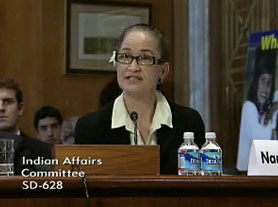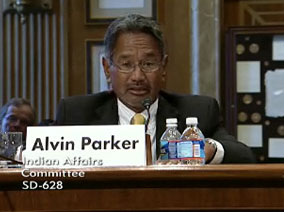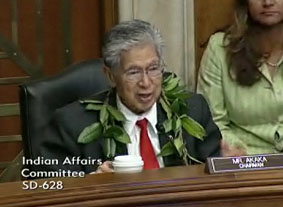Hawaiian Educators Spread Immersion Message in Washington
By Wendy Osher
Several Native Hawaiian educators traveled to Washington today to offer testimony on culture-based education. The witnesses discussed their success with Hawaiian immersion schools, and spoke on ways to replicate the programs in native communities across the nation.
The U.S. Senate Committee on Indian Affairs, chaired by U.S. Senator Daniel K. Akaka (D-Hawai’i), held the hearing to examine current trends and achievements in Native language and culture-based education.
During the hearing today, Sen. Akaka said the purpose of the gathering was to hear the different strategies that have been employed and, to help “Native students achieve and succeed,” and hear “perspectives on how to expand on current successes and promising trends.”

MS. NAMAKA RAWLINS, Liaison, ‘Aha Punana Leo / UH Hilo College of Hawaiian Language, Hilo, Hawaii. Image courtesy U.S. Sen. Committee on Indian Affairs.
“These languages are crucial to Native American literature, ceremonial life, spirituality, kinship practices, and overall indigenous identity,” said Namaka Rawlins, a liaison from ‘Aha Punana Leo and UH Hilo College of Hawaiian Language.
“It is possible to restore these languages to communities to assure that the continuity of Native American identity and to bolster the academic achievement and college and career readiness of native students,” said Rawlins.
Rawlins asked the committee to consider allowing the consortium in Hilo to serve as a federally mandated center for excellence for other Native American language schools, to serve parallel to a state education agency for the U.S. Department of Education. “It would build on our existing national coalition of indigenous language and culture based education network of researchers and practitioners in Native American Language immersion and culture-based schools,” said Rawlins.

MR. ALVIN PARKER, Principal, Ka Waihona o ka Na‘auao Public Charter School, Waianae, Hawaii. Image courtesy U.S. Sen. Committee on Indian Affairs.
“The combination of a cultural component and intensely rigorous academic curriculum provides the students with a solid base that allows them social mobility that is often not a reality for Native Hawaiians,” said said Alvin Parker, the Principal at Ka Waihona o ka Na‘auao Public Charter School in Waianae. “Education, whether it be cultural or academic,” Parker said, “plays a vital role in nurturing and sustaining our native people.”
Also scheduled to testify from Hawai’i was Dr. Shawn Kanaiaupuni, Ph.D., the Division Director at Kamehameha Schools.
The hearing highlighted efforts to meet student and Native community needs through education. The hearing will also reviewed recommendations for the reauthorization of the Elementary and Secondary Education Act (ESEA).
“The students participating in Native language and culture-based education are able to share in the knowledge and traditions of their ancestors while being empowered with the tools to combat contemporary challenges,” said Sen. Akaka.
Sen. Akaka said the hearing advances the important discussion on the value of immersion and cultural programs as well as possible next steps to advance such programs across the country.
According to the National Indian Education Association, approximately 300 distinct languages were once spoken in what is now the United States. Today, all of the less than 175 Native languages that survive are considered seriously endangered.
According to Sen. Akaka’s office, a number of Hawaiian language-immersion schools have flourished in recent years, with graduates attending top universities. He notes similar feats accomplished at Native language and culture-based schools in other states across the U.S.





_1768613517521.webp)



